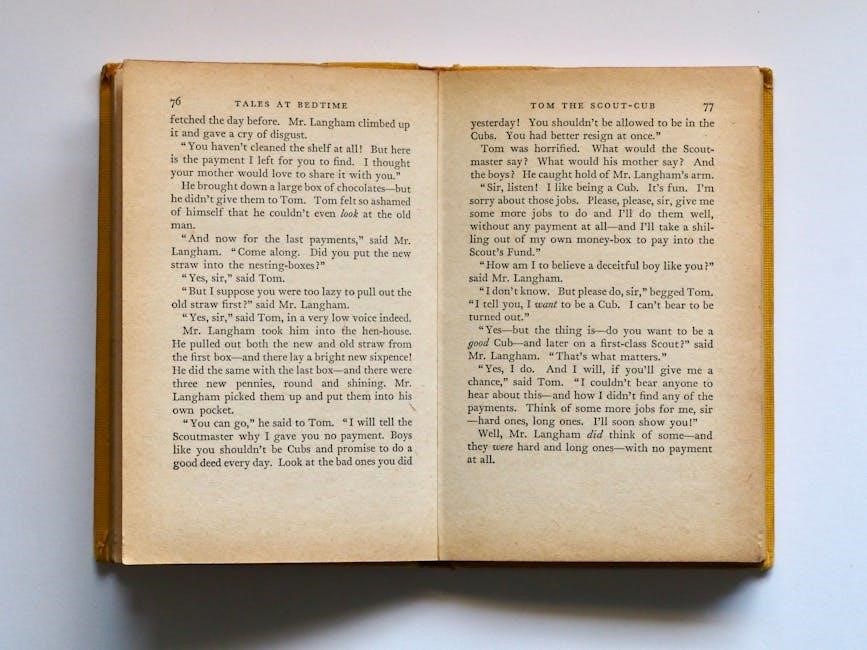Anton Chekhov’s The Bet is a gripping short story published in 1889, exploring themes of human endurance, morality, and the value of life through a wager between a banker and a young lawyer.
Overview of the Story
Anton Chekhov’s The Bet revolves around a daring wager between a banker and a young lawyer. The banker bets two million rubles that the lawyer cannot remain in solitary confinement for fifteen years. The lawyer accepts, seeking to prove his endurance. Over the years, the lawyer’s isolation deepens, and he immerses himself in books, transforming his perspective on life. The story explores themes of human resilience, morality, and the true value of freedom, culminating in a surprising resolution.
Historical Context and Background
The Bet, written by Anton Chekhov in 1889, reflects the social and philosophical debates of 19th-century Russia. The story emerged during a period of growing scrutiny of capital punishment and individual freedoms. Chekhov, known for his insightful exploration of human nature, crafted this tale to provoke thought on morality, isolation, and the true cost of sacrifice. Its themes resonate with the intellectual climate of his time, offering a timeless commentary on human values.

Plot Summary of “The Bet”
The Bet revolves around a wager between a banker and a young lawyer. The lawyer agrees to stay in solitary confinement for fifteen years in exchange for two million rubles. During his isolation, he reads extensively, transforming his perspective on life. The banker, facing financial ruin, considers killing the lawyer to avoid paying but discovers a note revealing the lawyer’s realization of the futility of material wealth, leading to a profound resolution.
The Bet Between the Banker and the Lawyer
The story begins with a heated debate about capital punishment at a party hosted by the banker. The banker argues that even the death penalty is less severe than life imprisonment, prompting the lawyer to challenge him. The lawyer bet that he could endure fifteen years of solitary confinement, while the banker, confident in the lawyer’s failure, stakes two million rubles. This reckless wager sets the stage for a profound exploration of human endurance and morality.
Key Events and Turning Points
The story unfolds with the banker and lawyer finalizing their wager, setting the terms for fifteen years of isolation. Over the years, the lawyer immerses himself in books, transforming from a man focused on material gain to one seeking intellectual and spiritual enlightenment. A pivotal moment occurs when the lawyer writes a letter renouncing his claim to the prize, realizing the true value of his newfound understanding. This decision shocks the banker, highlighting the profound change in the lawyer’s character and the moral implications of their bet.
Themes and Analysis
The Bet delves into themes of human nature, isolation, and personal growth, questioning materialism and the true value of freedom through the lawyer’s transformative journey and intellectual pursuits;
Exploration of Human Nature
The Bet probes deeply into human nature, revealing the complexities of ambition, greed, and self-discovery. The banker’s obsession with wealth contrasts with the lawyer’s evolving values, showcasing how isolation reshapes priorities. Chekhov examines the psychological effects of solitude, highlighting the lawyer’s transformation from a man driven by materialism to one enriched by knowledge and introspection. The story raises profound questions about the true cost of freedom and the essence of human fulfillment.
Morality and the Value of Life
The Bet delves into moral dilemmas, questioning the worth of human life versus material wealth. The banker’s willingness to gamble with the lawyer’s freedom for money contrasts with the lawyer’s ultimate realization of life’s true value. Chekhov’s narrative challenges readers to reflect on the ethics of such a wager, emphasizing the lawyer’s transformation from a man driven by greed to one who finds fulfillment in knowledge and inner peace, highlighting the moral superiority of spiritual enrichment over monetary gain.

Cultural and Literary Significance
The Bet holds significant cultural and literary value, influencing 19th-century literature with its psychological depth and moral complexity, while remaining a timeless reflection on human values and societal norms.
Impact on 19th-Century Literature
Anton Chekhov’s The Bet significantly influenced 19th-century literature by pioneering psychological depth and moral complexity in storytelling. Its exploration of human nature resonated deeply, setting a new standard for literary works. The story’s concise yet profound narrative style inspired many writers, contributing to the evolution of the short story genre. Its relevance to societal issues, like capital punishment, further solidified its impact on the literary landscape of the time.
Reception and Criticism
The Bet received widespread acclaim for its profound exploration of human nature and morality. Maxim Gorky praised Chekhov’s humanism, highlighting the story’s depth. Critics noted its psychological complexity and concise narrative style. The story’s themes resonated with readers, sparking debates on capital punishment and personal freedom. Its accessibility in PDF and other formats has ensured its enduring popularity, making it a cornerstone of 19th-century literary discourse.
Character Analysis
The banker evolves from confidence to regret, while the lawyer transforms through isolation, discovering inner peace and intellectual growth, contrasting their initial motivations and perspectives.
The Banker: Motivations and Psychology
The banker’s motivations stem from arrogance and a desire to prove his superiority, driven by a belief in human weakness. His willingness to stake two million roubles reflects his confidence in the lawyer’s inability to endure isolation. Over the years, the banker’s psyche shifts from triumph to guilt, as the moral weight of his bet haunts him. His eventual regret underscores Chekhov’s exploration of greed, remorse, and the true cost of ambition.
The Lawyer: Transformation and Growth
The lawyer undergoes profound transformation during his isolation. Initially driven by a desire to prove his resolve, he gradually shifts focus to self-discovery and intellectual growth. His extensive reading and reflection reveal a deepened understanding of life’s meaning, leading to a rejection of material wealth. This transformation highlights Chekhov’s emphasis on personal enlightenment and the lawyer’s emergence as a morally elevated individual, far removed from the ambitious man who initially accepted the bet.
Symbols and Symbolism in “The Bet”
The cell symbolizes isolation and confinement, while books represent knowledge and intellectual growth. These symbols explore human nature, morality, and the value of life, central to Chekhov’s narrative.
The Cell as a Symbol of Isolation
The cell in The Bet symbolizes physical and emotional isolation, confining the lawyer to a life of solitude. It represents a voluntary imprisonment, emphasizing the lawyer’s determination and sacrifice. The cell’s walls act as a barrier, cutting him off from the outside world, reflecting his internal struggle and the psychological toll of prolonged seclusion. Chekhov uses the cell to explore themes of endurance, solitude, and the human spirit’s capacity to endure confinement for a higher purpose.
The Role of Books and Knowledge
Books and knowledge play a central role in The Bet, as the lawyer’s extensive reading becomes his sole escape during isolation. Over fifteen years, he devours hundreds of volumes, from novels to scientific texts, symbolizing his pursuit of intellectual growth. Books not only sustain his mind but also reflect his internal transformation, contrasting with the banker’s materialism. This highlights Chekhov’s emphasis on the power of knowledge to transcend physical confinement and enrich the human spirit.
Download and Access Information
The Bet by Anton Chekhov is available for free download in PDF, EPUB, and MOBI formats from platforms like Gutenberg and other digital libraries, ensuring easy access for readers worldwide.
How to Download “The Bet” in PDF Format
To download The Bet in PDF, visit platforms like Project Gutenberg or other digital libraries. Search for the title, select the PDF option, and follow the download prompts. Ensure compatibility with your device for seamless reading. These platforms offer free, high-quality versions of the story, making it easily accessible for readers worldwide who appreciate Chekhov’s literary masterpiece.
Free Resources and Platforms
Project Gutenberg, ManyBooks, and Google Books offer free access to The Bet by Anton Chekhov in PDF and other formats. These platforms provide high-quality, digitized versions of the story, ensuring easy readability on various devices. Simply search for the title on these websites, select your preferred format, and download. These resources are ideal for readers seeking convenient and cost-free access to Chekhov’s timeless tale.

Quotes and Their Significance
Key quotes like “I bet you two million you wouldn’t stick in a cell for five years” highlight the central wager, underscoring themes of freedom and human endurance, while “voluntary imprisonment is heavier than enforced” reflects the psychological depth of the story, emphasizing the lawyer’s internal struggle and the banker’s moral dilemma, making these quotes pivotal to the narrative’s exploration of human nature and morality.
Key Quotes from the Story
One pivotal quote is, “I bet you two million you wouldn’t stick in a cell for five years,” showcasing the banker’s arrogance and the lawyer’s determination. Another significant line, “Voluntary imprisonment is much heavier than enforced,” highlights the psychological burden of the wager. These quotes encapsulate the story’s themes of human endurance, freedom, and moral dilemmas, providing insight into the characters’ motivations and the story’s deeper meaning.
Their Relevance to the Theme
The quotes underscore the story’s exploration of human nature, morality, and the value of life. The banker’s wager reflects societal views on wealth and freedom, while the lawyer’s endurance highlights personal growth and the psychological impact of isolation. These quotes emphasize the tension between materialism and intellectual pursuits, aligning with Chekhov’s critique of societal norms and his deeper examination of human motivation and redemption.

Comparison with Other Works by Chekhov
Chekhov’s The Bet shares themes of human nature and moral dilemmas with his other works, such as The Lady with the Dog and Ward No. 6, showcasing his mastery of psychological storytelling.
Similar Themes and Styles
Chekhov’s The Bet mirrors themes of human nature, moral dilemmas, and psychological complexity found in works like The Lady with the Dog and Ward No. 6. His concise, realistic style, focusing on internal struggles and societal critiques, aligns across his stories. The exploration of isolation and redemption in The Bet reflects Chekhov’s consistent interest in characters’ emotional journeys, making it a quintessential example of his literary approach.
Unique Aspects of “The Bet”
The Bet stands out for its intense focus on a single wager and its psychological implications. Unlike Chekhov’s other works, this story centers on a solitary, high-stakes agreement, eliminating secondary characters and subplots. The narrative’s tight structure and exploration of isolation, endurance, and moral transformation create a gripping, singular experience, showcasing Chekhov’s mastery of concise storytelling and profound thematic depth within a confined premise.
The Bet concludes with the lawyer’s profound realization about life’s value, leaving a lasting impact on themes of human endurance and moral reflection, showcasing Chekhov’s literary brilliance.
Final Thoughts on the Story
The Bet is a profound exploration of human endurance and moral dilemmas. The story’s climax, where the lawyer chooses freedom over wealth, underscores the true value of life. Chekhov masterfully portrays the psychological transformation of both characters, highlighting the futility of materialism. The tale’s timeless themes resonate deeply, inviting readers to reflect on their own values. Its availability in PDF and other formats ensures accessibility for modern audiences to experience this literary masterpiece.
Legacy of “The Bet” in Literature
The Bet remains a landmark in 19th-century literature, celebrated for its psychological depth and moral complexity. Chekhov’s concise yet powerful storytelling has influenced countless writers, solidifying his reputation as a master of the short story. The tale’s exploration of human nature and its accessible formats, such as PDF, ensure its enduring relevance, making it a timeless classic studied and admired worldwide for its profound themes and literary craftsmanship.
